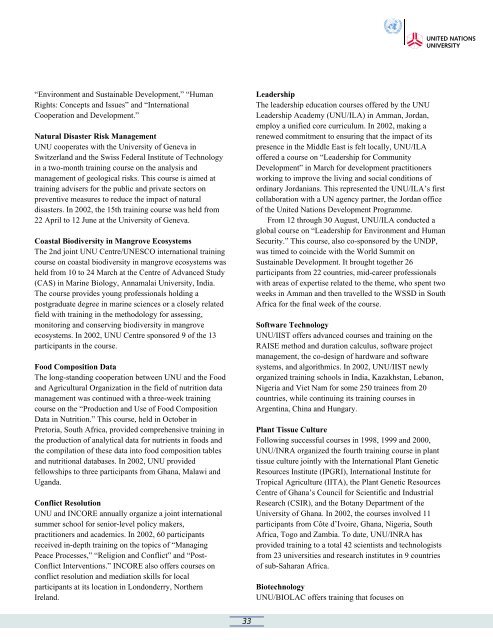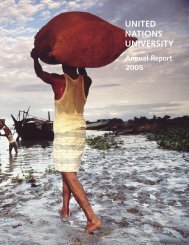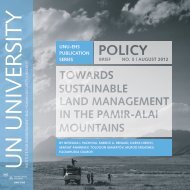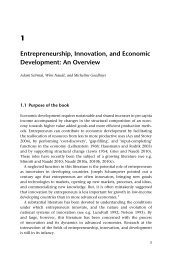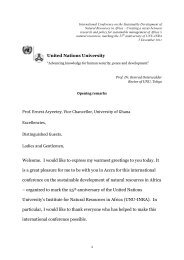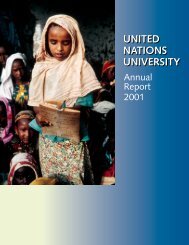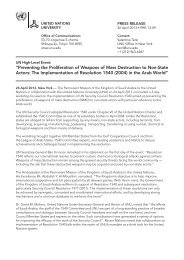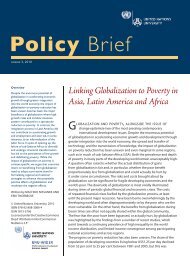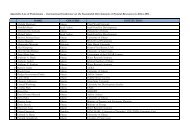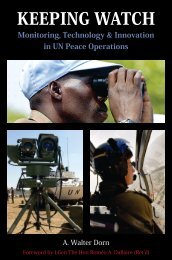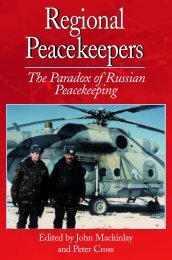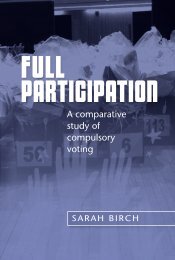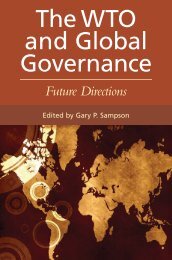Environment and Sustainable Development - United Nations ...
Environment and Sustainable Development - United Nations ...
Environment and Sustainable Development - United Nations ...
You also want an ePaper? Increase the reach of your titles
YUMPU automatically turns print PDFs into web optimized ePapers that Google loves.
“<strong>Environment</strong> <strong>and</strong> <strong>Sustainable</strong> <strong>Development</strong>,” “Human<br />
Rights: Concepts <strong>and</strong> Issues” <strong>and</strong> “International<br />
Cooperation <strong>and</strong> <strong>Development</strong>.”<br />
Natural Disaster Risk Management<br />
UNU cooperates with the University of Geneva in<br />
Switzerl<strong>and</strong> <strong>and</strong> the Swiss Federal Institute of Technology<br />
in a two-month training course on the analysis <strong>and</strong><br />
management of geological risks. This course is aimed at<br />
training advisers for the public <strong>and</strong> private sectors on<br />
preventive measures to reduce the impact of natural<br />
disasters. In 2002, the 15th training course was held from<br />
22 April to 12 June at the University of Geneva.<br />
Coastal Biodiversity in Mangrove Ecosystems<br />
The 2nd joint UNU Centre/UNESCO international training<br />
course on coastal biodiversity in mangrove ecosystems was<br />
held from 10 to 24 March at the Centre of Advanced Study<br />
(CAS) in Marine Biology, Annamalai University, India.<br />
The course provides young professionals holding a<br />
postgraduate degree in marine sciences or a closely related<br />
field with training in the methodology for assessing,<br />
monitoring <strong>and</strong> conserving biodiversity in mangrove<br />
ecosystems. In 2002, UNU Centre sponsored 9 of the 13<br />
participants in the course.<br />
Food Composition Data<br />
The long-st<strong>and</strong>ing cooperation between UNU <strong>and</strong> the Food<br />
<strong>and</strong> Agricultural Organization in the field of nutrition data<br />
management was continued with a three-week training<br />
course on the “Production <strong>and</strong> Use of Food Composition<br />
Data in Nutrition.” This course, held in October in<br />
Pretoria, South Africa, provided comprehensive training in<br />
the production of analytical data for nutrients in foods <strong>and</strong><br />
the compilation of these data into food composition tables<br />
<strong>and</strong> nutritional databases. In 2002, UNU provided<br />
fellowships to three participants from Ghana, Malawi <strong>and</strong><br />
Ug<strong>and</strong>a.<br />
Conflict Resolution<br />
UNU <strong>and</strong> INCORE annually organize a joint international<br />
summer school for senior-level policy makers,<br />
practitioners <strong>and</strong> academics. In 2002, 60 participants<br />
received in-depth training on the topics of “Managing<br />
Peace Processes,” “Religion <strong>and</strong> Conflict” <strong>and</strong> “Post-<br />
Conflict Interventions.” INCORE also offers courses on<br />
conflict resolution <strong>and</strong> mediation skills for local<br />
participants at its location in Londonderry, Northern<br />
Irel<strong>and</strong>.<br />
Leadership<br />
The leadership education courses offered by the UNU<br />
Leadership Academy (UNU/ILA) in Amman, Jordan,<br />
employ a unified core curriculum. In 2002, making a<br />
renewed commitment to ensuring that the impact of its<br />
presence in the Middle East is felt locally, UNU/ILA<br />
offered a course on “Leadership for Community<br />
<strong>Development</strong>” in March for development practitioners<br />
working to improve the living <strong>and</strong> social conditions of<br />
ordinary Jordanians. This represented the UNU/ILA’s first<br />
collaboration with a UN agency partner, the Jordan office<br />
of the <strong>United</strong> <strong>Nations</strong> <strong>Development</strong> Programme.<br />
From 12 through 30 August, UNU/ILA conducted a<br />
global course on “Leadership for <strong>Environment</strong> <strong>and</strong> Human<br />
Security.” This course, also co-sponsored by the UNDP,<br />
was timed to coincide with the World Summit on<br />
<strong>Sustainable</strong> <strong>Development</strong>. It brought together 26<br />
participants from 22 countries, mid-career professionals<br />
with areas of expertise related to the theme, who spent two<br />
weeks in Amman <strong>and</strong> then travelled to the WSSD in South<br />
Africa for the final week of the course.<br />
Software Technology<br />
UNU/IIST offers advanced courses <strong>and</strong> training on the<br />
RAISE method <strong>and</strong> duration calculus, software project<br />
management, the co-design of hardware <strong>and</strong> software<br />
systems, <strong>and</strong> algorithmics. In 2002, UNU/IIST newly<br />
organized training schools in India, Kazakhstan, Lebanon,<br />
Nigeria <strong>and</strong> Viet Nam for some 250 trainees from 20<br />
countries, while continuing its training courses in<br />
Argentina, China <strong>and</strong> Hungary.<br />
Plant Tissue Culture<br />
Following successful courses in 1998, 1999 <strong>and</strong> 2000,<br />
UNU/INRA organized the fourth training course in plant<br />
tissue culture jointly with the International Plant Genetic<br />
Resources Institute (IPGRI), International Institute for<br />
Tropical Agriculture (IITA), the Plant Genetic Resources<br />
Centre of Ghana’s Council for Scientific <strong>and</strong> Industrial<br />
Research (CSIR), <strong>and</strong> the Botany Department of the<br />
University of Ghana. In 2002, the courses involved 11<br />
participants from Côte d’Ivoire, Ghana, Nigeria, South<br />
Africa, Togo <strong>and</strong> Zambia. To date, UNU/INRA has<br />
provided training to a total 42 scientists <strong>and</strong> technologists<br />
from 23 universities <strong>and</strong> research institutes in 9 countries<br />
of sub-Saharan Africa.<br />
Biotechnology<br />
UNU/BIOLAC offers training that focuses on<br />
33


